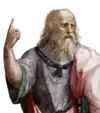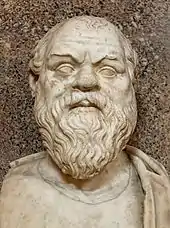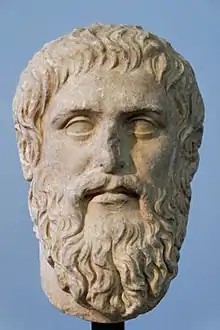Demodocus (dialogue)
Demodocus (/dɪˈmɒdəkəs/; Greek: Δημόδοκος) is purported to be one of the dialogues of Plato. The dialogue is extant and was included in the Stephanus edition published in Geneva in 1578. It is now generally acknowledged to be a fabrication by a late sophist or rhetorician, probably later than mid-fourth century BC.[1]
| Part of a series on |
| Platonism |
|---|
 |
| The dialogues of Plato |
|
| Allegories and metaphors |
| Related articles |
| Related categories |
|
► Plato |
|
It appears to be a combination of two separate works. The first part is a monologue (addressed to Demodocus) which argues against collective decision-making. There then follows a trilogy of dialogues (with anonymous participants) which raise three elements of doubt against common sense.[1]
References
- John Madison Cooper, D. S. Hutchinson, (1997), Plato, Complete works, page 1699. Hackett Publishing.
External links
- Demodocus translated by George Burges
- Free public domain audiobook version of Demodocus translated by George Burges
 Apocrypha public domain audiobook at LibriVox. Collection includes Demodocus. George Burges, translator (1855).
Apocrypha public domain audiobook at LibriVox. Collection includes Demodocus. George Burges, translator (1855).
This article is issued from Wikipedia. The text is licensed under Creative Commons - Attribution - Sharealike. Additional terms may apply for the media files.

